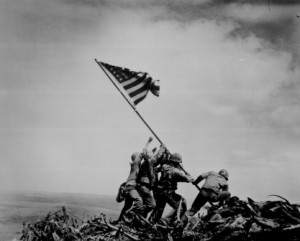I’ve just finished reading Matterhorn, Karl Marlantes’ critically-lauded and best-selling novel, reportedly based on his own service as an infantry officer with the US Marines in Vietnam’s de-militarized zone.
Matterhorn has been widely-praised for its unflinchingly realistic yet nuanced portrayal of the psychology and relationships of young men at the business end of a vicious jungle war.
I’m not so sure.
As I plowed through its seven hundred pages, more and more doubts came into my mind. The Marines of Marlantes’ fictional Bravo Company, One-Twenty Four Marines, are foul-mouthed, filthy, cynical, unpatriotic, unmannerly to their officers, ill-disciplined and sometimes downright cowardly. I may be ex-Army myself (Operation Desert Storm 1991: Ramstein Air Base; if you weren’t there you won’t understand), but I refuse to believe that the men of the USMC would ever sink to such depths. I have met many Marines while they were on active service overseas, and they were always clean, courteous and immaculately turned-out as they let me into their embassies.
Many details of Marlantes’ narrative do not gel with my own knowledge of the war in Vietnam. For instance, Marlantes states that Marines would usually only put 18 rounds into their 20 round M16 magazines, to prevent jams caused by weak springs. I have read in several books that the true figure was 19.
In Full Metal Jacket, several of the Marines wore peace symbols and similar beatnik regalia on their helmets and flak jackets as ironic symbols to demonstrate their commitment to the war against communism. In Matterhorn, only one character does so. Bit perfunctory, Mr Marlantes. Smacks of box-ticking.
The novel’s Vietnamese characters are oddly unrounded: indeed, the Vietnamese themselves are almost entirely absent, appearing only as figures glimpsed in the jungle, or fleetingly in the heat of a fire-fight. None has been given any real dialogue, much less an opportunity to interact with the American protagonists in a literal or symbolic examination of the meaning of war, and of America’s undoubted if sometimes frustrated good intentions. Yet such exchanges were clearly a commonplace for US infantry personnel, and radio DJs, serving in ‘Nam.
My doubts hardened yet further when I flicked through the military glossary appended at the end of the novel. Marlantes defines the term “O.P.” as standing for “outpost”. Wrong, Karl. It stands for “observation post”. Always has done, always will.
His derivation for the term “poag” – it should be spelled “pogue” – meaning a soldier serving his country in a logistical capacity, is quite incorrect: I shall not repeat it here. As those of us who served with pride in the US Army quartermaster corps could have told him, “pogue” derives from the Gaelic word “póg”, or kiss, and refers to the great esteem in which rear-echelon support personnel are held by the rest of the military.
Elsewhere, he claims that the weight of a 155 mm howitzer shell, at 95 pounds, was nearly three times the weight of a 105 mm shell. This rang alarms bells with me. In fact, a standard Nato M1 105 mm high explosive shell weighs 18.1 kg, or just short of 40 pounds. Three would weigh 120 pounds. The figures just don’t add up.
It is with great sadness that I say this, but there is a history of people with poor military records, or no record at all, falsifying their life stories to claim combat experience in Vietnam. This kind of imposture is much more difficult in relation to my own war, Desert Storm: there were special tee-shirts on sale at all the PX stores, and if you didn’t buy one, then you weren’t there. Case closed.
How do we know that Marlantes is not himself a sad fantasist, guilty of a massive fraud on the American reading public? Apart from his Navy Cross, Bronze Star, two Navy Commendation Medals for Valor, two Purple Hearts and ten Air Medals, what trace did he leave of his alleged time in the bush along the DMZ? Nobody I ever met at dinner parties in Georgetown or Annapolis mentioned having served with him.
Remember John Kerry? We don’t get fooled again.
One last thought: when did the Marines get to be so goshdarned whiney?










I am an Australian Vietnam veteran. I read Matterhorn on the recommendation of a friend, and I can’t believe it was written by a Vietnam veteran or even a trained soldier. At one point he has a marine “chambering a round” when he loads an M-60 machine gun. Not possible. The M-60 fires from an open bolt. He also has a marine cleaning his M-16 rifle and “snapping the barrel back into place”. Not possible. The barrel is fixed to the upper receiver and cannot be snapped back in to place. No veteran, trained and experienced in the use of these weapons, would ever make such basic mistakes in describing their function. I can’t find him on any authoratative list of Rhodes scholars or DSC recipients. I suspect he’s a fraud.
Excellent points, Allan. Thanks.